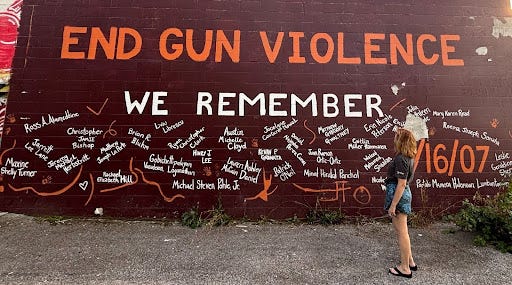What We Lost on April 16
Eighteen years later, Virginia Tech’s tragedy still haunts us. But it also points to what we must do.
On April 16, 2007, 32 people were shot and killed on the campus of Virginia Tech. Seventeen more were injured. It was, at the time, the deadliest mass shooting in American history.
I was no longer a student at Tech, but I knew people who were there. Fellow students when I attended Tech were professors teaching classes on the day of the shooting. Two, a married couple, spent hours locked down, desperately trying to reach the daycare where their child was. In the days that followed, the horror only deepened. While most victims were identified in 24 hours, for some it took nearly three days due to the extent of their injuries. Many parents drove to campus in anguish, praying for a miracle, clinging to hope, unsure if their child was alive or gone.
When I was a student there, this was a place where the doors were always open, where students wandered freely from office hours to study groups to spontaneous debates that stretched into the night. It was a place of safety, curiosity, and connection. A place that helped shape me into the person and the lawyer I became.
But on that day, classrooms became crime scenes. Professors used their bodies to barricade doors. Students jumped from windows to survive. And an entire community was left to carry the weight of loss along with the frustration of knowing it could have been prevented.
The shooter never should have had a gun. Under existing law at the time, he should have been denied the right to purchase one. But the background check system wasn’t able to work as it should because we had not invested sufficient national and state resources to ensure the records were consistently input and uploaded into the system now kept by the FBI that is our nation’s background check system. The shooter’s disqualifying mental health records never made it to the national Brady Background Check System. He was able to buy a gun despite the fact that he should have been denied the purchase.
In the aftermath, some progress was made. Congress passed the NICS Improvement Amendments Act to help ensure resources were given to states to update their system and upload all records into the Brady Background Check System. But even that progress is now at risk, under renewed efforts to dismantle oversight and gut the very infrastructure meant to stop these kinds of tragedies from happening again.
We learned hard, painful lessons from that day. But the real question is: did we act on them?
Today, too many campuses are being put at risk by the rollbacks of strong gun laws and regulations at the federal level, and by the antipathy to violence prevention shown by Virginia’s Gov. Glenn Youngkin, who vetoed more than 15 bills that would have made all Virginians, including college students, safer. On this anniversary, we are thinking specifically about SB 1182/HB 1876, which would have given public universities — like Virginia Tech and so many others in the Commonwealth — explicit permission to ban firearms on their campuses. We know the presence of guns in places of learning do not make us safer, and yet Gov. Youngkin took decisive action against a policy that would have removed the presence of firearms from these institutions.
Rather than focusing on proven solutions like robust permitting systems and strengthened background checks, gun lobby-backed lawmakers suggest policies that create the illusion of safety while ignoring the real risks. Like proposing we arm more teachers, or force colleges to allow concealed guns on campus, as if this will somehow make us safer. Introducing more firearms into learning environments doesn’t prevent violence; it changes the very nature of those spaces and raises the risk of gun violence rather than limiting it. It also results in a chilling effect: How do you foster provocative conversation, open debate, or freedom of expression if everyone around you might be carrying a gun?
Universities should be places where young people grow, challenge assumptions, and feel safe enough to fail, to speak freely, to dream boldly. That’s what Virginia Tech gave me. I would not be who I am today without it. And it’s devastating to me that it is remembered first for what happened on April 16.
At Brady, I’ve had the honor of working alongside people forever shaped by that day. Colin Goddard, who was shot four times in his French class, went on to become a powerful voice for change. Some of the bullets remain in his body — too close to arteries to remove, and made of lead, raising serious long-term health concerns. His father, Andrew, became a tireless Brady chapter leader and advocate for gun violence prevention in Virginia.
I visit the campus often, and each time I do, I make sure to visit the memorial. There are 32 stones, arranged in a semi-circle, each one marking a life stolen far too soon. It’s a place of stillness, sorrow, and reflection.

The legacy of that day will never be just a memory etched in stone. It was a turning point. Everyone involved in this movement understands that we need to build a future that does not yet exist. A future where college campuses — and movie theaters, and churches, and grocery stores, and elementary schools — are sacred places that deserve protection.
We owe it to those we lost to imagine boldly, act urgently, and never settle for a world where this is normal.
We remember them. And through action, we keep their memories alive.




